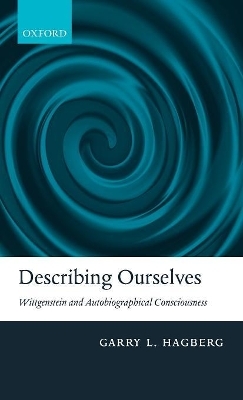
Describing Ourselves
Oxford University Press (Verlag)
978-0-19-923422-6 (ISBN)
The voluminous writings of Ludwig Wittgenstein contain some of the most profound reflections of recent times on the nature of the human subject and self-understanding - the human condition, philosophically speaking. Describing Ourselves mines those extensive writings for a conception of the self that stands in striking contrast to its predecessors as well as its more recent alternatives. More specifically, the book offers a detailed discussion of Wittgenstein's later writings on language and mind as they hold special significance for the understanding and clarification of the distinctive character of self-descriptive or autobiographical language.
Garry L. Hagberg undertakes a ground-breaking philosophical investigation of selected autobiographical writings - among the best examples we have of human selves exploring themselves - as they cast new and special light on the critique of mind-body dualism and its undercurrents in particular and on the nature of autobiographical consciousness more generally. The chapters take up in turn the topics of self-consciousness, what Wittgenstein calls 'the inner picture', mental privacy and the picture of metaphysical seclusion, the very idea of our observation of the contents of consciousness, first-person expressive speech, reflexive or self-directed thought and competing pictures of introspection, the nuances of retrospective self-understanding, person-perception and the corollary issues of self-perception (itself an interestingly dangerous phrase), self-defining memory, and the therapeutic conception of philosophical progress as it applies to all of these issues.
The cast of characters interwoven throughout this rich discussion include, in addition to Wittgenstein centrally, Augustine, Goethe, Dostoevsky, Kierkegaard, Iris Murdoch, Donald Davidson, and Stanley Cavell, among others. Throughout, conceptual clarifications concerning mind and language are put to work in the investigation of issues relating to self-description and in novel philosophical readings of autobiographical texts.
Garry L. Hagberg presently holds a Chair in the School of Philosophy at the University of East Anglia, and has for some years served as the James H. Ottaway Professor of Philosophy and Aesthetics at Bard College. He is the author of Art as Language: Wittgenstein, Meaning, and Aesthetic Theory and Meaning and Interpretation: Wittgenstein, Henry James, and Literary Knowledge (both Cornell University Press), he recently edited Art and Ethical Criticism and is co-editing A Companion to Philosophy of Literature (both for Blackwell). He has contributed widely to journals, collections, and reference works, and is presently completing a series of articles on literary experience and self-formation. Hagberg is joint editor, with Denis Dutton, of the journal Philosophy and Literature.
Foreword: Confronting the Cartesian Legacy ; 1. Autobiographical Consciousness ; 2. The Self, Reflected ; 3. The Self, Speaking ; 4. The Self, Thinking ; 5. The Question of True Self-Interpretation ; 6. The Uniqueness of Person-Perception ; 7. Rethinking Self-Interpretation ; Acknowledgments ; Index
| Erscheint lt. Verlag | 22.5.2008 |
|---|---|
| Verlagsort | Oxford |
| Sprache | englisch |
| Maße | 149 x 223 mm |
| Gewicht | 479 g |
| Themenwelt | Geisteswissenschaften ► Philosophie ► Sprachphilosophie |
| ISBN-10 | 0-19-923422-1 / 0199234221 |
| ISBN-13 | 978-0-19-923422-6 / 9780199234226 |
| Zustand | Neuware |
| Haben Sie eine Frage zum Produkt? |
aus dem Bereich


